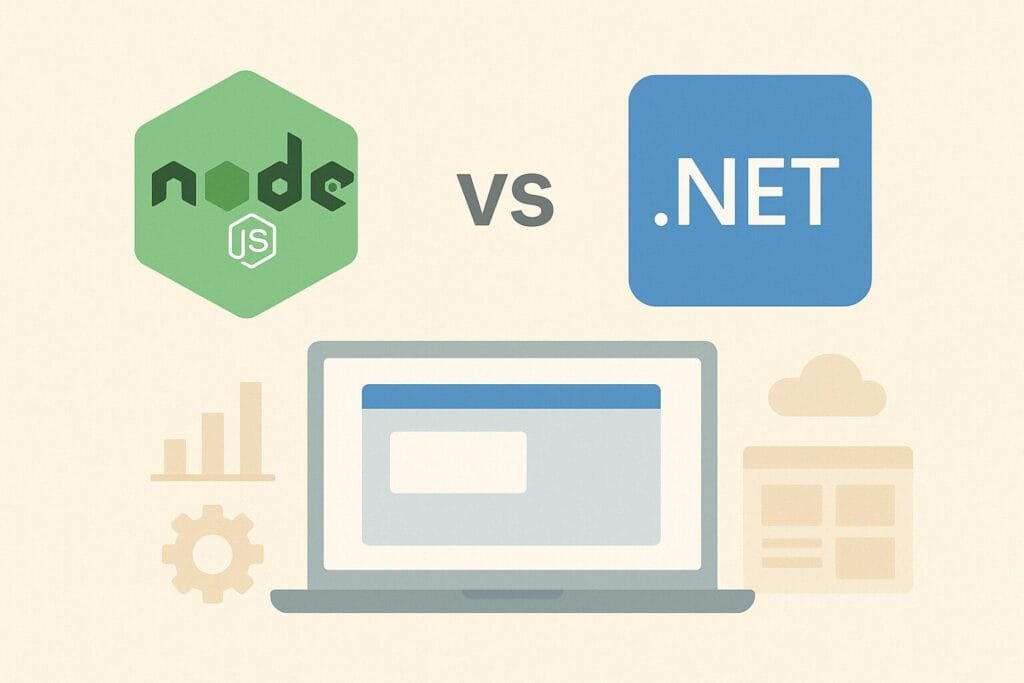Choosing the right technology stack for enterprise applications is one of the most important decisions that can define the scalability, performance, and long-term success of a business. Two of the most widely discussed options are Node.js and .NET. Both are powerful frameworks with strong communities, enterprise-grade features, and proven use cases. But when it comes to building enterprise apps, which one is the better choice?

What is Node.js?
Node.js is an open-source, cross-platform runtime environment that allows developers to run JavaScript on the server side. It is known for its non-blocking I/O model, scalability, and ability to handle large volumes of requests efficiently. Node.js is particularly popular in modern web applications, microservices, and real-time applications such as chat systems and streaming platforms.
What is .NET?
.NET, developed by Microsoft, is a versatile framework that supports multiple programming languages like C#, F#, and VB.NET. It is widely adopted in enterprise environments because of its maturity, robust security features, and seamless integration with Microsoft products. The latest version, .NET Core (now simply called .NET 5+), is cross-platform and open-source, making it more competitive than ever.
Key Differences Between Node.js and .NET
Although both are great choices for enterprise applications, their strengths lie in different areas. Below is a detailed comparison:
| Feature | Node.js | .NET |
|---|---|---|
| Language | JavaScript / TypeScript | C#, F#, VB.NET |
| Performance | Excellent for I/O-intensive tasks, event-driven | High performance for CPU-bound operations |
| Scalability | Highly scalable with microservices architecture | Scalable with enterprise-grade tools |
| Security | Requires third-party libraries and best practices | Built-in enterprise security and identity management |
| Cross-platform | Yes (Linux, macOS, Windows) | Yes (.NET Core/.NET 5+) |
| Community & Support | Large open-source community | Strong enterprise and Microsoft support |
| Use Cases | Real-time apps, microservices, APIs | Enterprise systems, financial apps, ERP, CRM |
Advantages of Node.js for Enterprise Apps
- Speed and Scalability: Non-blocking I/O and event-driven architecture make Node.js ideal for handling concurrent requests.
- Large Ecosystem: npm provides thousands of libraries that accelerate development.
- Cross-platform: Applications can run across multiple operating systems.
- Real-time Features: Great for chat apps, IoT, and streaming solutions.
Advantages of .NET for Enterprise Apps
- Robust Security: Comes with enterprise-level authentication, authorization, and encryption support.
- Strong Microsoft Integration: Works seamlessly with Azure, Office 365, and other Microsoft products.
- Performance: Great for CPU-intensive workloads and large-scale enterprise systems.
- Mature Ecosystem: Stable, reliable, and used by Fortune 500 companies worldwide.
When to Choose Node.js
You should choose Node.js if your enterprise application requires:
- Real-time communication (e.g., messaging apps, collaborative tools).
- High scalability with microservices architecture.
- Integration with modern front-end frameworks like React, Angular, or Vue.
- Faster development cycles with JavaScript/TypeScript.
When to Choose .NET
.NET is the right choice if your application demands:
- High security and compliance requirements (e.g., healthcare, finance).
- Integration with Microsoft enterprise services.
- Complex enterprise applications like ERP or CRM systems.
- CPU-intensive tasks requiring optimized performance.
Real-World Use Cases
- Node.js: Used by Netflix, LinkedIn, and PayPal for highly scalable and real-time services.
- .NET: Used by Microsoft, Stack Overflow, and Dell for enterprise-grade applications.
External Resources
For further insights on enterprise application development, you can visit Gartner IT research for industry reports and recommendations.
Conclusion
Both Node.js and .NET are excellent choices for building enterprise applications. The decision ultimately depends on your project requirements. If you want scalability, fast development cycles, and real-time features, Node.js is the better choice. However, if your project requires enterprise-grade security, tight Microsoft integration, and CPU-heavy workloads, .NET is the way to go.
In short, there is no one-size-fits-all answer. Evaluate your enterprise goals, existing infrastructure, and development team expertise before making the final decision.

